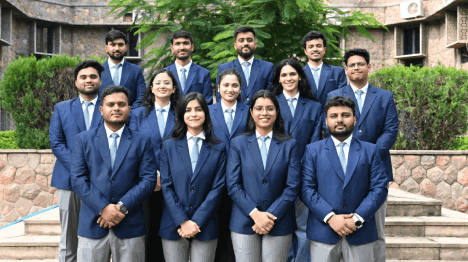- About Us
-
Academics
Schools
Programs
General Information
-
Faculty
The faculty members and researchers working at IIHMR University come from varied backgrounds including, but not limited to medicine, public health, management, economics, statistics, demography, human geography, social and behavioral sciences, rural development and pharmaceuticals.
-
Admissions
- Research
Publications & Journal
- Executive Education
Executive Programmes
- Online Certification Courses
ONLINE CERTIFICATION Courses
- Training
- Placements
- Contact
- Pradanya
- Blog
- Fee Payment
- NAAC
- IQAC
- NIRF
-
About Us
- About IIHMR University
- Board of Management
- Academic Council
- Board of Studies
- Research Board
- Institutional Review Board
- Finance & Audit Committee
- Departmental Research Committee
- Chairperson's Message
- President's Message
- IIHMR University Act
- Infrastructure
- Collaboration
- Ranking
- Board of Studies (School of Digital Health)
- Awards & Accolades
-
Academics
- Institute of Health Management Research
- School of Pharmaceutical Management
- ML Mehta School of Development Studies
- School of Digital Health
- SD Gupta School of Public Health
- MBA (Hospital and Health Management)
- MBA (Pharmaceutical Management)
- MBA (Development Management)
- MBA (Healthcare Analytics)
- Master of Public Health
- Student Manual – Cohort 9 (2021-2023)
- Master of Public Health (Offered by Johns Hopkins Bloomberg School of Public Health, USA in cooperation with IIHMR University, Jaipur, India)
- Ph. D.
- MBA CSR & ESG Management (Executive)
- MBA Sustainable Business Management (Executive)
- Common Information for all the Programs
- Academic Calendar
- Student Handbook 2020-21
- Committees
- Policies
- Annual Exam Calendar
- Library
- Faculty
- Officers of University
- Dean of Institute of Health Management Research
- Dean of School of Pharmaceutical Management
- Dean of School of Development Studies
- Dean of SD Gupta School of Public Health
- Dean of School of Digital Health
- School of Digital Health
- Faculty List A to Z
- Faculty List Designation Wise
- Faculty List School Wise
- Admissions
- Research
- Executive Education
- Training
- Placements
- Alumni
- Events
- Job Openings
- Contact
- Research
Knowledge, Attitude and Practices (KAP) study on therapeutic injections in Punjab: A community-based study
Agency : WHO-India
Communicable diseases like Hepatitis B and C and HIV are the most common health hazards in India due to unsafe injections. The objective of the study was to understand the knowledge, attitude, and practices of the community and other stakeholders with respect to injection use and underlying practices and propose a list of common practices for the development of communication material for behavioral change. It also studied healthcare waste management practices in health facilities; and recommend ways to increase safe injection.
Injections use is one of the most common medical procedures in India, with a frequency of injections being 2.9 per person per year. About 95% of injections are used for therapeutic purposes and about 63% of injections are unsafe. In-country like India injection safety is a major concern. Use of unsafe injections put patients/clients, doctors, nurses, phlebotomist, paramedical staff, biomedical waste management staff, ragpicker and community residing in area at risk of getting infectious and non-infectious diseases.
The study findings were helpful in
- Preventing unsafe therapeutic injections;
- Developing IEC/BCC material to create awareness of safe injection use among key stakeholders (health care providers and community);
- Planning for reducing demand for unnecessary injections; and
- Effective Implementation of bio-waste management with special attention on sharp waste
This study was about observing the knowledge, attitude, and practices regarding the use of injections both by community and healthcare providers in two districts of Punjab, covering rural and urban areas of the state. More than 2000 households and 50 patients/clients were interviewed. In addition, the injection use process, provider-client interaction was observed.



